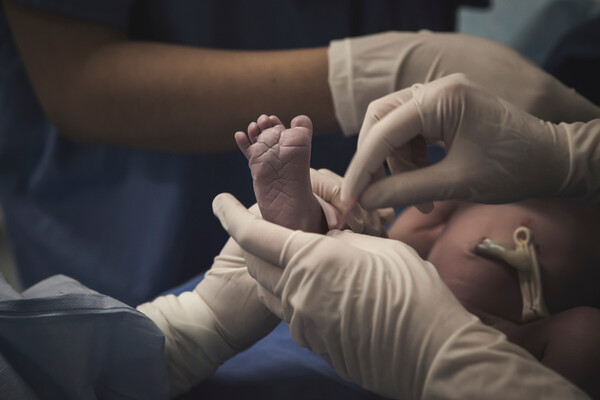A court has recognized a hospital's liability for the death of a patient in a neonatal intensive care unit due to the late discovery of an accident by medical staff.
However, the court partially limited the liability by considering the condition of the deceased patient and the circumstances at the time.

In a recent ruling, the Suwon District Court ordered the hospital to pay approximately 156 million won ($119,000) in damages, including alimony and delayed interest, following a lawsuit filed by the patient's bereaved family against the hospital management.
On July 8, 2019, a baby was transferred to the hospital due to low oxygen saturation and tachypnea. Admitted to the neonatal intensive care unit (NICU), the newborn was treated with endotracheal intubation and a ventilator for neonatal respiratory distress syndrome. As the baby’s condition improved later, the intubation was removed.
However, at around 4 p.m. on July 9, medical workers observed respiratory problems again and confirmed a pneumothorax in his right lung. So, they intubated him and inserted a chest tube. Later, an ultrasound examination confirmed persistent neonatal pulmonary arterial hypertension and the medical staff switched to a breathing machine with high-frequency oscillatory ventilation.
As per the hospital's final nursing record, at 9:01 a.m. on July 10, medical staff heard the baby’s cries and observed the unintended removal of the inserted tube. A new tube was inserted at around 9:06, but his condition deteriorated rapidly, and CPR was performed. At 9:20, a chest radiograph confirmed a pneumothorax of the left lung, and a chest tube was inserted about seven minutes later. CPR was continued, but the newborn died about two hours later. The cause of death is believed to be neonatal pulmonary hypertension with neonatal respiratory distress syndrome and complications of bilateral pneumothorax, emphysema, and pericardial emphysema.
In response, the bereaved family, including the mother, filed a lawsuit against the hospital, claiming that the medical staff's negligence led to their baby's death, demanding that the hospital pay 617.74 million won in damages, including alimony and delayed interest.
The court concluded that the medical staff exhibited negligence in the delayed detection of the unintended extubation incident.
According to the medical records, the baby’s vital signs were normal until shortly before the alleged incident. At 9:02 p.m., shortly after the incident was discovered, the nursing records noted that the baby was cyanotic and that ambush bagging showed "the patient was rigid with no movement." Six minutes later, the newborn’s oxygen saturation could not be measured, and his heart rate stopped.
"The circumstances and history of the rapid deterioration of the baby's condition, as well as the lack of any intervening cause between the time the medical staff discovered the incident and the time his heart stopped, bears out the inference that the medical staff were negligent in delaying the unplanned extubation," the court said.
The court noted that the baby was intubated with a tracheal tube without a cuff, which was "easily dislodged by simple movement," and that the medical staff had failed in their duty of care, as it was "entirely foreseeable that a dislodged tube would result in a fatal situation, including increased hypoxia."
Although the accident played a part in the deterioration of the baby's condition, "if the unplanned extubation had been immediately recognized by the medical staff and acted upon in time, the baby would not have died," it said.
The hospital argued that the medical staff could not have caused the incident, considering the NICU’s operation system, but the court did not accept this.
"It is difficult to accept the hospital’s argument because a newborn baby is so small that it would be very difficult to confirm an unplanned extubation visually, and because it is a NICU with critically ill patients," the court said.
Conversely, the court dismissed the family's assertions that the medical staff caused the unplanned extubation or contributed to a delayed diagnosis of pneumothorax.
"The rate of unplanned extubation in the NICU is higher than in children and adults. Newborns could unavoidably cause unplanned extubations due to their anatomy and other reasons," it said. “The fact that an unplanned extubation occurred cannot be used to conclude that the medical staff breached any duty of care."
The court said that the family’s argument that the nursing notes were later redacted and that "the medical staff deliberately redacted them to obstruct the evidence" was also rejected, given the nature of the intensive care unit and the emergency nature of the situation.
However, the rewrite was based on the medical staff's recollections and "cannot be relied upon verbatim," it added.
Considering all these, the court limited the hospital's liability to 30 percent.
"Respiratory distress syndrome has a mortality rate of 6.3 percent, and the estimated mortality rate associated with persistent pulmonary hypertension in neonates is 7-10 percent. Even if there had been no unplanned delay in extubation, it is difficult to see that the baby’s condition would have been very hopeful," it said.
It was also noted that the delay in the discovery of the accident was "not as late as the family claim" and that, despite the delay, the medical team had "used all available methods and resources to the best of their ability" to help the baby recover, the court pointed out.
The court added it also considered that the anatomy of a newborn baby makes it difficult to see whether it is extubated and that "a high degree of care would have been required to detect (the accident) immediately."
It concluded that the delay in detecting the accident was due to "structural and practical problems with the operation and staffing of the NICU, rather than problems with the competence or attention of individual medical staff."
Accordingly, the court ordered the hospital management to pay 156,162,508 won in damages, including 22 million won in alimony, plus delay charges, dismissing the remaining claims.

